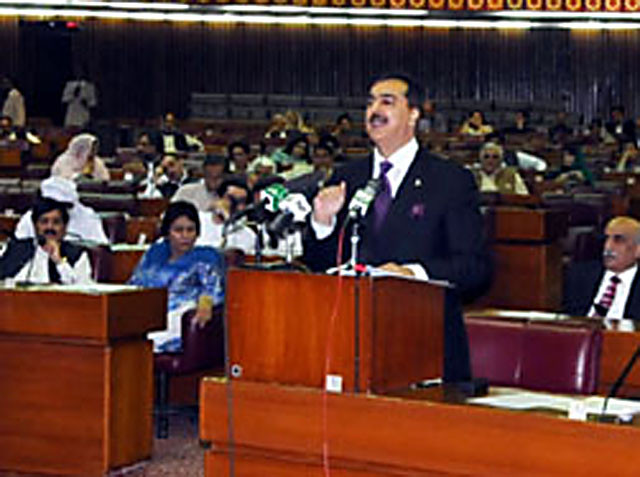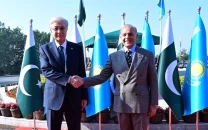Pak-US ties: Parliament unanimously adopts revised recommendations draft
Raza Rabbani says draft unanimously approved. Says it heralds a new chapter in formulating foreign policy in Pakistan.

Pak-US ties: Parliament unanimously adopts revised recommendations draft
PCNS Chairman Senator Raza Rabbani, while presenting the revised recommendations in the parliament had said that the recommendations had been drafted unanimously, indicating that there was consent of Jamiat Ulema-e-Islam (JUI-F) chief Maulana Fazlur Rehman.
Rabbani said that should the parliament approve these revised recommendations, it will signal a new era when it comes to the formulation of Pakistan's foreign policy and national security. He thanked all political parties in engaging themselves for the preparation of the new revised draft.
The PCNS chairman said that before this review, the foreign policy had been an exclusive domain of the establishment. This was the first time the parliament had decided matters of the foreign policy especially with respect to the US.
"Now the foreign policy of the state is in the hands of representatives of the people of Pakistan," said Rabbani.
Earlier, Rabbani had announced that the committee had finalised the draft after reaching consensus among all the political parties. However, it was unclear whether Rehman, who was not present at the meeting, had agreed to the revisions.
According to Express News correspondent, the final draft doesn’t include an earlier condition that barred foreign countries from using Pakistani bases. Another condition that called for a ban on operations by foreign intelligence agencies was also removed from the final draft.
JUI-F chief Rehman wanted to submit his dissent note on the final draft and was earlier boycotting the proceedings of the committee, which is reviewing its recommendations regarding Pakistan’s engagement with the United States on the issue of Nato/Isaf supplies. President Asif Ali Zardari, however, on Wednesday held a meeting with Rehman and convinced him to attend the meeting today.
The committee took a two-and-a-half hour break before it finalised the recommendations.
On Thursday, the committee developed a collective opinion, linking the resumption of Nato supply lines to an end to drone strikes in Pakistan.
US looking forward to working with Pakistan after ties re-set
"We have seen that the joint session of the Pakistani parliament has just approved the final recommendations of the Parliamentary Committee on National Security. We respect the seriousness with which this review has been conducted. We look forward to discussing these policy recommendations with the Government of Pakistan,” Laura Lucas, a State Department spokesperson told The Express Tribune.
Before the break
Pakistan Muslim League – Nawaz (PML-N) submitted three additional recommendations regarding intelligence operators, reopening Nato supply line minus transport of weaponry, and halting drone strikes.
The parliamentarians who attended the bicameral PCNS meeting confided to The Express Tribune that the panel will finalise a fresh draft of recommendations regarding Pakistan-US relations, but are focusing on an additional clause that would “force the US to stop drone strikes in Pakistan”.
“We have almost finalised a new draft that…all parties agreed to,” Chairman PCNS Raza Rabbani told reporters and added that the government is trying to convince Rehman to give his proposals for the new draft.
The JUI-F continued its protest and boycotted the meeting of the PCNS reviewing its recommendations regarding Pakistan’s terms of engagement with the US. The new draft (review) came after the opposition in the joint sitting said that some of the clauses were against the interest of the state.
Correction: An earlier version of the article read "dissent" as "dissident". The error has been rectified.



















COMMENTS
Comments are moderated and generally will be posted if they are on-topic and not abusive.
For more information, please see our Comments FAQ